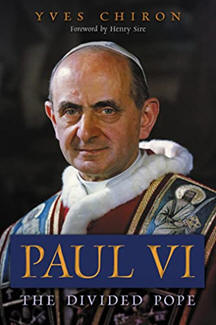Catholic Medical Quarterly Volume 73(1) February 2023
Book Review
Paul VI: The Divided Pope
By Yves Chiron, Angelico Press
Reviewed by Dr Pravin
 This
is a well-researched and thoughtful biography of the complex and enigmatic
Pope Paul VI. To the best of my knowledge, it is the first major biography
of Paul VI in the English language since the ex-Jesuit priest Peter
Hebblethwaite's largely sympathetic account published back in 1993. This
work is somewhat more critical of the pope but it is a sober and
well-documented account. I admit to first having looked at the index to
see whether the name Roger Peyrefitte was there. It was not. This is not a
work of sensationalism.
This
is a well-researched and thoughtful biography of the complex and enigmatic
Pope Paul VI. To the best of my knowledge, it is the first major biography
of Paul VI in the English language since the ex-Jesuit priest Peter
Hebblethwaite's largely sympathetic account published back in 1993. This
work is somewhat more critical of the pope but it is a sober and
well-documented account. I admit to first having looked at the index to
see whether the name Roger Peyrefitte was there. It was not. This is not a
work of sensationalism.
To say that Paul VI was deeply divided in his thoughts and actions is hardly controversial. He himself wondered, as the author notes, if he was Hamlet or Don Quixote. My own interest is with regard to his famous, or infamous, encyclical Humanae Vitae. It is briefly mentioned here. But the overall work explains so much. After the encyclical was condemned by liberals, Cardinal O'Boyle of Washington attempted to discipline dissident theologians, including Charles Curran. It was Paul VI's Vatican that prevented him from doing so. This is not mentioned in the book but, as already noted, it is what one might have expected from a pope divided within himself.
Why this inconsistency? There is so much evidence of this in this book. Like his great namesake, perhaps he was trying to be all things to all people. In which case, he very much misunderstood Paul of Tarsus.
Paul VI has gone down in history as the Pope who disciplined the traditionalists but who allowed the liberals to run riot. Before he was elected Pope, the author writes that he secretly met with liberal Cardinals from Germany, Belgium, Holland and France. What was said? Look at the state of the Church in these places now.
Paul VI was capable of writing profoundly Thomistic encyclicals, like his Mysterium Fidei on the Eucharist. And yet, as the author so well documents, he was unable to control the liturgical revolution that took place during his pontificate. Surprisingly, even Conservative Cardinals like Siri largely kept quiet. Only Cardinals Ottaviani and Bacci were courageous enough to intervene. They were not successful. Pope Paul did send the great architect of the liturgical revolution, Annibale Bugnini, to Iran as a kind of punishment later. The great mystery is this: Paul was a deeply cultured and sensitive man. This side of him comes through so clearly in this work. In many ways, he was unlike Pope Francis. He was incapable of criticising his own flock for “breeding like rabbits”. He had an excellent formation in Catholic theology. Francis may be the catalyst, but it was Paul who started the reaction. Perhaps it was in his desire to open some windows to let in some fresh air. Alas, what went in was not fresh at all.
When, for example, the liberal Cardinal Suenens proposed the idea that bishops should co-responsibly teach with the pope, Paul could have condemned him. He did not. Of course, what Suenens really wanted was for liberals like himself to teach with the Pope. There would be no room at the table for Conservatives like Siri and Ottaviani.
When we look at the current crisis in the Church, we are witnessing the ways in which Veritatis Splendor and Familiaris Consortio have already been undermined. I suspect that Humanae Vitae might get the chop next. It would probably not be condemned outright. More likely, it will be proposed as an ideal to be aimed at. Like getting to heaven. There will be what is known as a "paradigm shift" in moral thinking. Another lovely idea from the sixties.
Traditionalists who seem to blame Francis for the current problems need to read this important book. They will learn that Pope Paul VI has to be held responsible to a significant extent for the current crisis in the Church.
